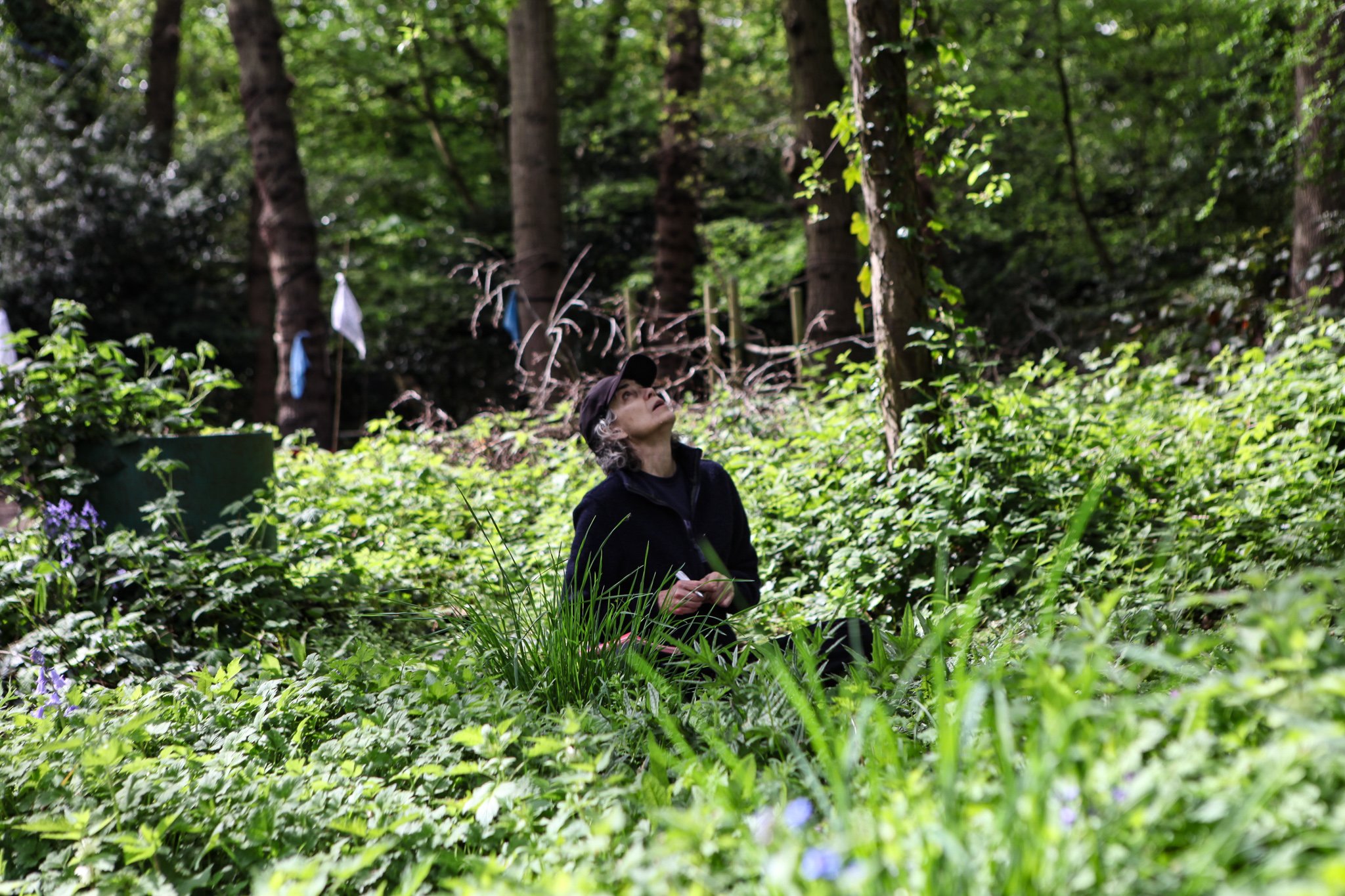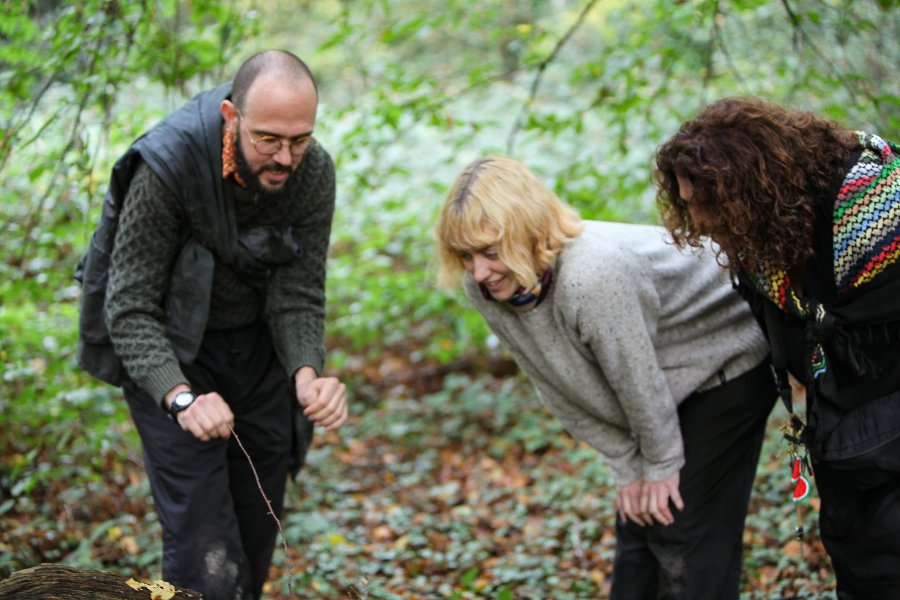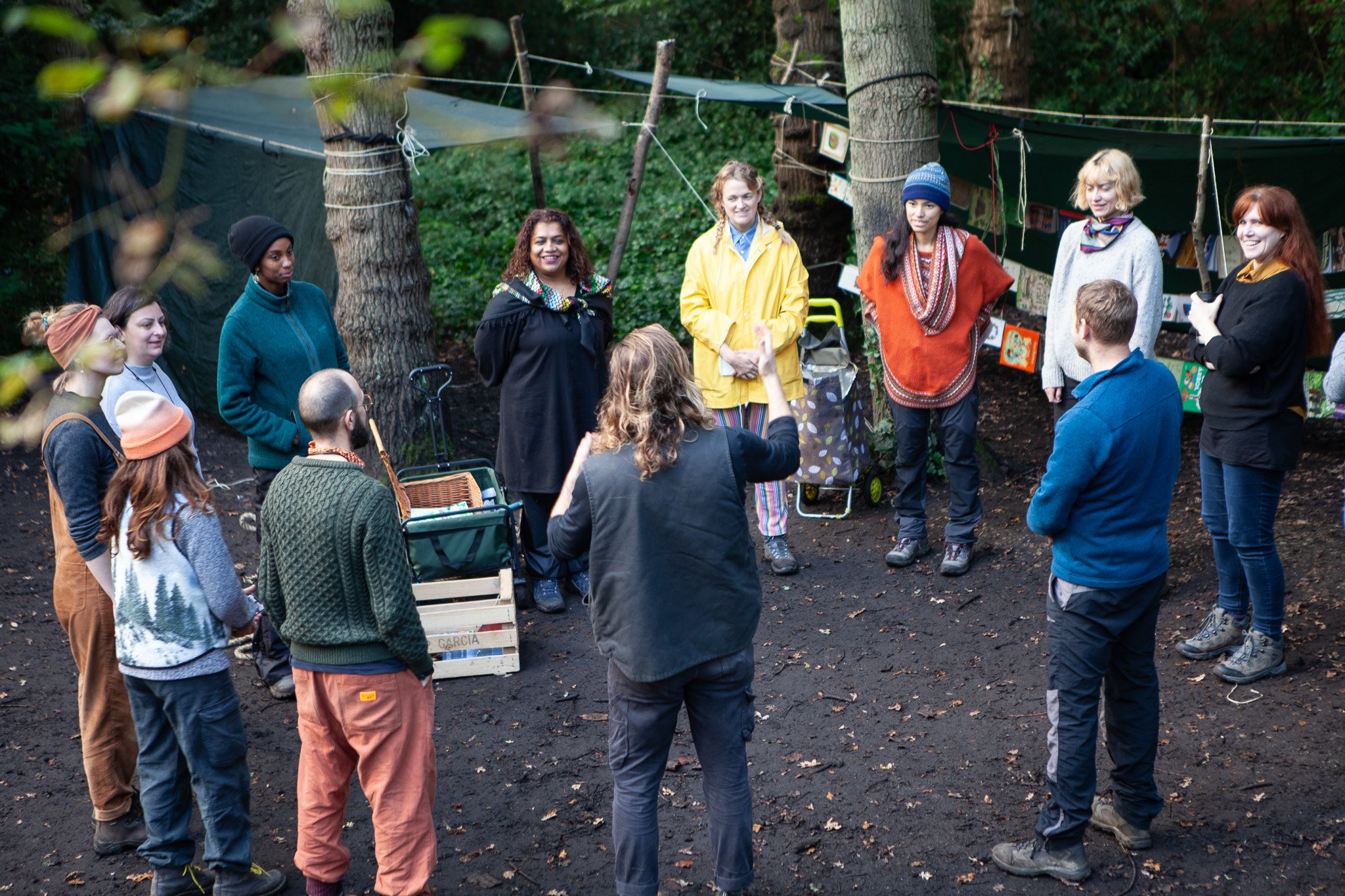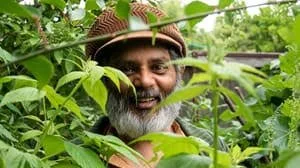permaculture design course training
in partnership with rakesh rootsman rak
tuesday 14th - sunday 19th october 2025 ~ 10am-5pm
tuesday 24th - sunday 29th march 2026 ~ 10am-5pm
tuesday 14th - saturday 18th july 2026 ~ 10am-5pm
secluded woodland ~ east london e11
“permaculture is common sense in a world where sense is no longer common” ~ rakesh rootsman rak
“the greatest work that we can do is to heal the land and restore the systems that support life, to create systems that are more than sustainable, that are restorative and regenerative." ~ bill mollison, permaculture: a designers' manual
about the training
this fully certified course (certified by the permaculture association britain and roots n permaculture) will delve deep into how we can use permaculture to create rich beneficial relationships between people, communities and their surroundings, including how to grow food, build houses and create economies, while also enriching and taking care of nature.
special emphasis will be put in creating a temporary community for the duration of the course, where we use social permaculture tools, especially sociocracy to make sure everyone’s needs are met, so we can all enjoy living together in a joyful, supportive learning environment.
———————————————--
registration and payment for this course are going through rakesh not kin.
rakesh’s emai is rakeshaji@gmail.com
registration form here.
-
permaculture is a design system for creating abundance in all aspects of our lives. permaculture teaches us how build natural homes, grow our own food, restore diminished landscapes and ecosystems, catch rainwater, build communities, take care of waste and much more.
the word 'permaculture' historically comes from 'permanent agriculture' and has evolved into 'permanent culture' - it is about living lightly on the planet, and making sure that we can live in harmony with nature while sustaining human activities for many generations to come.
permaculture is a rigorous and systematic set of tools, ecological principles and methodologies, underpinned by ethics, which help us to design and create this culture of permanence. a culture that allows us to design how we cater for all our needs and the needs of the planet and all its creatures, without exploiting or depriving other humans or creatures of their needs.
the ultimate goal is to create systems that create abundance for all humans, creatures and mother earth, without exploitation of humans, animals or earth’s non renewable resources.
with permaculture insight we can design our inner tranquility, it can be applied to creating integrated and supportive communities, building or retrofitting houses to be more energy efficient, creating ethical businesses and livelihoods, as well as creating rich abundant low maintenance food growing spaces.
-
sociocracy is a whole system governance and decision making method which is based on and encourages equivalence, transparency, and effectiveness in an organisation. it encourages collaborative innovation, minimises lengthy governance meetings, and helps everyone participate in shaping the decisions that affect them.
during the pdc we will put sociocracy into practice on a daily basis. the first day of the course we establish what every person wants form the course, form which we derive a common vision. we then create a mission and aims on how to achieve our vision. we then embed a feedback mechanism to check if we are meeting these aims, so we can keep adjusting our collaboration every day.
sociocracy ensures everyone's voice is heard and all our individual and collective needs are met.
-
12 day permaculture design course, with 6 optional hands on and site visit days.
part 1: june tue 3rd & wed 4th + fri 6th & sat 7th (9am-6pm)
part 2: sep tue 2nd & wed 3rd + fri 5th & sat 6th (9am-6pm)
part 3: oct tue 14th & wed 15th + fri 17th & sat 18th (9am-6pm)
————————————
optional hands on days and site visits:
thursdays 5th jun, 4th sep, 16th oct (timings tbc)
sundays 8th jun, 7th sep, 19th oct (timings tbc)
————————————
one day sessions:
for those who cannot make the full course, some of the days will be open to the public as stand alone one day courses
introduction to collaborative working (sociocracy) - june 3rd 2025
introduction to permaculture for self reliance - june 4th 2025
water management + creating healthy soil for food growing - june 6th 2025
forest gardening: low maintenance food growing - june 7th 2025
urban permaculture + livelihoods - 2 september 2025
designing buildings and structures - 3rd september 2025
engaging children in permaculture and designing learnscapes - 5th september 2025
off grid living (esp. energy) - 6th september 2025
nb for full time students the additional days are for design work
————————————
optional hands on days or site visits:
5 june 2025 optional day (subject tbc)
8 june 2025 optional day - making biochar cook stoves + liquid feeds
4 september 2025 optional day (subject tbd with group)
7 september 2025 optional day - pedal power generators
16 october 2025 optional day (subject tbd with group)
19 october 2025 optional day (subject tbd with group)
the optional days we will be building something that the group decide upon. this could be pedal power electricity generators, biochar cook stoves, rocket stoves, pizza oven, grow beds, composting systems, solar dryers, etc
-
the course will from day one put into practice social permaculture. we will larn sociocracy to create a community and practically explore how we ensure everyone's needs are met, and how everyone can safely express themselves, without conflict. having found our inner balance and balance within our newly forged community, we then move into exploring the traditional permaculture syllabus, including environmentally friendly food growing; soil generation; water management; house building; alternate economics and livelihood, etc.
having explored the theory of permaculture ethics, principles and approach to challenges, we will then move on to in depth design work and practicals (hands-on work), which solidifies the theory.
the emphasis remains on learning the patterns and concepts that are applied in permaculture, so you can apply this to all aspects of your life after the course has finished. hence the practicals will be a way to reinforce the theory and design work that we cover.
where and when appropriate we will visit nearby intentional communities and projects that integrate permaculture in their design (subject to consent by the students).
the syllabus will cover the following areas
- principles of natural systems
- sustainable design methodologies
- patterns in nature
- reading the land & understanding natural processes
- water harvesting techniques
- design principles of sustainable human settlements
- grey water recycling
- natural building design strategies
- food forests, plant guilds, gardens for self-sufficiency
- energy conservation technologies
- urban permaculture and transition towns
- wildlife management and biological pest control
- community activism
- invisible structures: people, community, economics, ecovillages
- sociocracy; dragon dreaming; six thinking hats
- community supported agriculture
- at the end of the course, students engage in a group design project.
-
the food will be self organised, which to start with means people need to bring their own food. however as the course progresses and as we make start making various types of cook stoves, we may collectively choose to cook collectively for the group. this will be decided collectively by all of us during the course.
-
this is a non residential course so no accommodation is offered, however if you are not local and need accommodation please get in touch and we can do our best to find you some local accommodation.
camping on site not possible - however we can recommend a nearby camping site debden house if you want to camp.
for anyone wishing to stay in a live in vehicle, we have a carpark space for parking during session times. outside of this, it's possible to park up on bushwood road behind the site.
-
east london e11 - full details on registration and confirmation of payment
-
there are 12 core mandatory days, with 6 optional days where we will do hands on or site visits.
payment options for the 12 to 18 days is based on gift economy, where participants are invited to contribute what they can afford and are willing to pay. the cost of putting on the course means we need to raise on average £450 per person. however we invite you to propose how much you would like to contribute somewhere in the range of the following
ideal contribution £580
average contribution £450
minimum contribution £300
we encourage those of you who can contribute more to do so, which should allow us to cover our costs, however if the minimum is outside of your ability to contribute then please let us know of your circumstances so we can see if we can find a way to get you on the course.
if there is a shortfall in the final sum (which by experience is unlikely), we will suggest the shortfall to be covered anonymously via a magic hat process. this process is part of the permaculture ethos, which allows people to pay according to their capacity, while meeting the needs of the hosts, teachers, etc.
-
payment and financial responsibility for this course is directly with rakesh not kin.
bank transfer to a uk bank account in pounds
bank transfer to a euro bank account
paypal (pounds, usd, euro)
-
to register for this course, please fill in the following form. if you have any difficulty or have any questions please feel free to contact rakesh
-
all classes will be in english however if there are a number of people who require a translator please let us know and we will work to accommodate this.
as part of our community culture we will create a process which ensures if there are words or sentences you do not understand we will address it immediately. also at the end of each day you wok in a small group to review the day which can be in local language, so if there is something you misunderstood this is your chance to catch up.
to help prepare for the workshop, you are encouraged to use this list of permaculture, forest gardening, sociocracy and plant names that have been translated into many languages
-
this course adheres to the permaculture association britain's accreditation criteria for permaculture design courses (pdc's). however due to the rising cost of the certification and in order to make the course affordable we consulted with the permaculture association britain (pab) and concluded to give the participant the choice of being accredited via the permaculture association britain (£20 for the certificate and additional administration) or by the roots n permaculture collective school (£5) or a digital rnp certificate for free. the roots n permaculture collective school certificate affords you the same privilege as the certificate from pab, meaning with this certificate you can still teach intro courses (after at least 1 year or putting permaculture into action) and can also apply to do your diploma (with any association anywhere in the world). the only difference between the two is that the pab certificate helps to pay the learning coordinator of pab to develop and maintain their high standard curriculum.
-
“i feel truly blessed that i was introduced to the world of permaculture by rakesh. in addition to his remarkable lexical knowledge, he also has impressive experience in his field. he is using his tools brilliantly to accompany the group, allowing everyone to discover and experience the "permaculture eye" in their own individual way and rhythm. thanks to his experience and wisdom, he trusts and navigates with confidence even in the midst of conflicts and tensions. with his authentic, warm-hearted, kind and honest personality, which is nourished by his spiritual path, he is able to maintain a safe and supportive space in which the group has the opportunity to immediately apply and experience the principles of permaculture and sociocracy. rakesh is a very dedicated, passionate facilitator who not only talks about the path, but walks it every minute of his life. I whole-heartedly recommend his courses to anyone who is hungry for intellectual and spiritual nourishment in addition to the theory and practice of permaculture” ~ adrienne, past permaculture design course participant
more feedback can be found here.
-
course and content, please contact rakesh:
facebook: https://www.facebook.com/rootsmanrak
email: rakeshaji@gmail.com
the facilitator
-
an experienced permaculture designer teacher, forest garden specialist, yoga teacher, homeopath and reggae dj.
rakesh has been designing and teaching permaculture to individuals and communities since 2009, and has taught over 500 permaculture, forest gardening, eco village design and related courses. his design portfolio ranges from a forest garden on part of a 30-hectare ecovillage in croatia that he co-owned through to many urban community food growing gardens, private farms and back gardens as well as designing collaborative businesses, urban water retention systems and even computer software and documentation systems.
rakesh is also passionate about sharing his journey of self empowerment (learning how to make all the things you need for yourself rather than relying on the system to provide for you), this includes eco architecture (low impact housing); capturing and storing energy (electricity, heat, lighting, etc); fuel efficient heating systems (rocket heaters and stoves); water capture, purification and recycling systems, natural bee keeping and so on.
he is one of the founders of the children in permaculture project which was launched at the international permaculture convergence in this year. so be prepared to go off on inspirational tangents occasionally.

rakesh is a very dedicated, passionate facilitator who not only talks about the path, but walks it every minute of his life. I whole-heartedly recommend his courses to anyone who is hungry for intellectual and spiritual nourishment in addition to the theory and practice of permaculture” ~ adrienne, past permaculture design course participant








